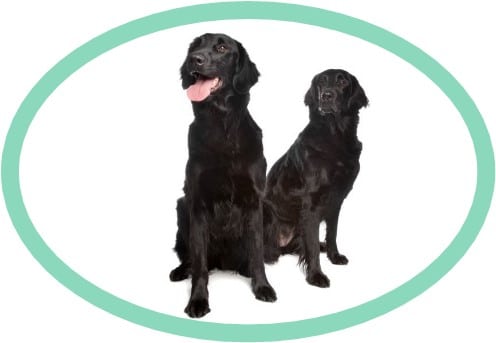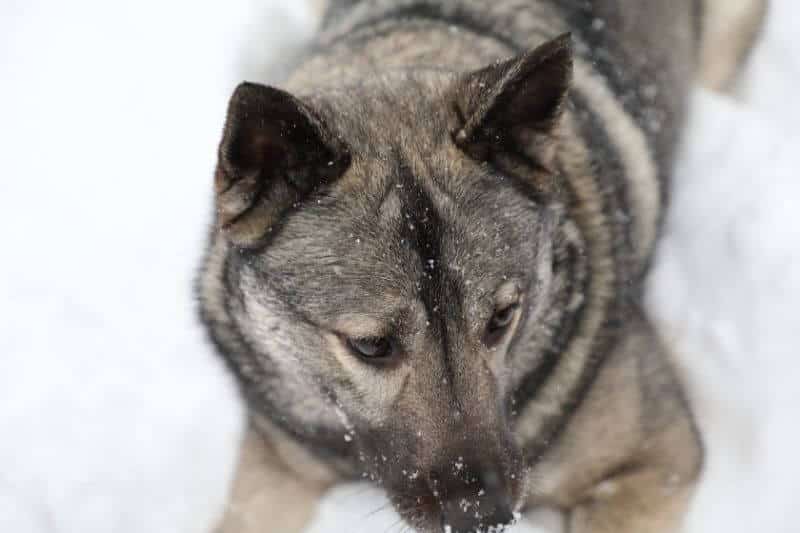A Nova Scotia Duck Tolling Retriever comes with several expenses that a future owner will want to budget. This includes vet fees, training costs, food-related expenses, supplies, grooming and much more. To help with financial planning as a family welcomes a Duck Toller into their home, we have designed a detailed cost calculator.
A Nova Scotia Duck Tolling Retriever puppy is likely to cost between $1,800 and $3,500 with the average price being $2,500. First-year expenses are around $5,020 and will be about $1,415/year (or $118/month) after that. Through the dog’s lifetime, the average cost of owning a Toller is $22,000.
These figures account for essential expenses, such as supplies, training, medical costs, food, treats, grooming costs, license, microchip, and the like. Additionally, optional costs like insurance or dog walking services are not included. If you spay/neuter your dog, enroll in a pet insurance plan, use a boarding facility for one week every year and require a dog walker for 50 weeks of the year, the total cost of ownership is likely to rise to the $82,750 to $212,235 range!
The higher end of the price range is applicable for better quality products and services, particularly if you are living in expensive areas, with the lower end of the spectrum indicating prices in less expensive areas.
Below, we delve into these different costs, offer professional opinions from a dog trainer, a veterinarian, a certified groomer as well as a dog walker and share tips on saving as you raise your Nova Scotia Duck Tolling Retriever. At the bottom, you will also find a cost calculator that lets you apply your unique situation and requirements to generate a much more accurate, personalized estimate of the cost of owning and raising a Nova Scotia Duck Tolling Retriever.
Newsletter Subscribers get:
Before & After you Get a Puppy (2 eBooks)
+ Our Dog Supplies Checklist
+ Coupons & Discounts
ALL FOR FREE

“Allow me to help you prepare for your new dog, make the best decisions, and save.”
Johann – PetBudget Founder
For general information about the cost of puppies and dogs, you can read The True Cost of a Dog (50 breeds compared) on our blog. If you are serious about adopting or buying this breed, keep reading this article. To compare the cost with other ones, visit our All Breeds page. You can also read our New Dog Owner Guide to learn everything about welcoming a dog home.
Quick Links
- Puppy Cost
- Supplies Cost
- Training Cost (dog trainer’s opinion)
- Medical Cost (veterinarian’s opinion)
- Food Cost
- Grooming Cost (groomer’s opinion)
- Other Costs (dog walker’s opinion)
- Total Cost
- PetBudget Cost Calculator
Nova Scotia Duck Tolling Retriever puppy price
Duck Tollers are hard to find. After reviewing 8 ads from sources that include the American Kennel Club, NextDayPets, breeders websites, and PuppyFind, we have found that the price of a Nova Scotia Duck Tolling Retriever puppy (6-month-old and younger) ranges from $1,800 to $3,500. This puts the average cost at $2,500, with 80% of the prices found falling within the previous range.
| Puppy Cost | Range | Average Cost |
| Nova Scotia Duck Tolling Retriever | $1,800 – $3,500 | $2,500 |
For a purebred with documents, expect to pay as high as $4,000. On the other hand, adoption prices are considerably lower, with rehoming or adoption fees typically falling between $50 and $500 across the board. Always give your business to reputable breeders and shelters to increase your chances to raise a healthy and happy dog.
Also, keep in mind that prices vary according to location, so you might be able to save money if you locate a shelter or breeder in a cheaper locality.
WONDERING HOW AND WHERE TO FIND A DUCK TOLLING RETRIEVER PUPPY TO BUY OR A DOG TO ADOPT? Our Guide will help you find a dog near you. We share the 24 best places to find your perfect pet.

If you want to know more about the price of puppies in the US or compare this breed with 150 others, check our puppy prices article based on the analysis of close to 50,000 ads (for 151 different breeds).
Factors affecting the price of puppies and why prices vary for the same breed.
Purebred or mixed. Usually, mixed-breeds are sold at a lower price than purebred dogs.
Bloodline and breeder’s reputation. If the parents are purebred show quality dogs from a reputable breeder, the price will be substantially higher. These breeders also tend to invest more money than others to take care of their breeding dogs and puppies.
Registration papers/pedigree. Some breeders are members of kennel clubs, the most famous being the American Kennel Club (AKC). They can also have their breeding dogs and puppies registered which would also add to their fees.
Health screenings and medical expenses. Serious breeders will have their breeding dogs and/or puppies evaluated/tested for different medical conditions. Moreover, some will take their puppies to the vet for an exam, deworming, vaccines, and/or microchip implantation prior to selling them. This drives the price higher but also reduces the risk to get an unhealthy dog.
Training and socialization. Some breeders sell their dogs after they are trained and socialized. It will increase the puppy’s price but generate savings as you most probably won’t have to invest in more training and also gives a better chance to get a well-behaved dog.
Breed popularity in the buyer’s location. Local supply and demand will have an impact on puppy prices. For example, small dogs tend to be more popular in metropolitan areas where people live in smaller spaces. Some breeds are more in demand in colder climates, others where hunting is popular, etc. It is worth looking for prices in different locations, but it is risky to buy a dog without having seen it before or at least have met with the breeder and visited the kennel.
Age. As most people want to get their puppy as young as possible, prices tend to be lower when the dog gets older. For example, on average a 6-month-old pup is likely to be less expensive than an 8-week-old one.
Coat color and markings. Coat color trends can change quickly. For any breed, some colors are more popular than others, sometimes temporarily. When the interest for a specific coat color grows, puppies get more expensive as an increase in demand leads to a higher market price. Also, for purebred dogs, only specific colors and color combinations are accepted by kennel clubs. Finally, puppies with rare colors can be very expensive as well.
What supplies should you buy for your Nova Scotia Duck Tolling Retriever?
Our team has filtered over 250 items across the best-sellers lists on Amazon, Walmart, and PetSmart to help gauge your expenses when it comes to supplies needed for a medium-sized dog like the Duck Toller. From these figures, the cost of supplies for the first year should fall within the $185-$790 range, with an average cost of $410.
| Supplies Prices | Range | Average Cost |
| Food & Water Bowls | $5 – $40 | $15 |
| Dog Collars (x2) | $10 – $40 | $20 |
| Leash | $5 – $20 | $10 |
| ID Tag with Phone Number | $5 – $20 | $10 |
| Dog Bed (36″ or 42″) | $20 – $85 | $50 |
| Dog Crate (36″ or 42″) | $30 – $120 | $55 |
| Plastic Poop Bags (900-1080) | $15 – $110 | $55 |
| Pooper Scooper | $10 – $30 | $20 |
| House Training Pads (75-100) | $15 – $45 | $25 |
| Stains and Odors Removal Spray | $5 – $20 | $10 |
| Toys | $30 – $100 | $60 |
| First-Aid Kit | $15 – $50 | $30 |
| Brush | $5 – $45 | $15 |
| Shampoo | $5 – $20 | $10 |
| Tooth-brushing Kit | $5 – $15 | $10 |
| Toenail Clippers | $5 – $30 | $15 |
Obviously, you will spend more on supplies for your Nova Scotia Duck Tolling Retriever the first year. For each subsequent year, expect to pay $75-$330 on supplies, or $185 on average. It considers items that warrant repurchase, such as toys, hygiene-related products, and maybe a dog bed. Prices can vary from store to store and depend on quality and location as well.
| Total Supplies Cost | Range | Average Cost |
| First Year | $185 – $790 | $410 |
| Subsequent Years | $75 – $330 | $185 |
Keep in mind that we have not accounted for things like muzzles, harnesses, clothing and shoes, fences, doggy playpens, anti-chew sprays as the need for these products varies on a case-by-case basis. Finally, to find potentially better deals, consider checking second-hand websites and stores to save big.
Check our Dog Supplies Guide and get tips to choose the right items for you and your dog (bowls, collar, leash, bed, and crate size, etc.). Learn everything about costs, and find the best products available.
If you are on a budget check our special selection and buy everything new for less than $200.
Leave your email at the top or bottom of this article to get our free supplies checklist with tips to select the right size for each product.
Training a Nova Scotia Duck Tolling Retriever
According to dog trainer and animal behaviorist, Alexa Diaz, Ph.D., professional training is recommended for a Nova Scotia Duck Tolling Retriever. Private lessons are advised and would help with potty training as well as positive leadership. Additionally, group classes for basic obedience are also beneficial. It’s important to know that Duck Tollers are very smart and high-energy dogs and will need a lot of physical and mental stimulation.
You will be looking at anywhere between $550 and $800 for 3 to 5 private lessons and $150 to $200 for 5 group lessons, depending on your locality.
| Training Cost | Range | Average Cost |
| Nova Scotia Duck Tolling Retriever | $700 – $1,000 | $850 |
Reading a dog training book and educating yourself on dog behaviors and psychology before welcoming the pet will also ease up the process.
Get Ready to Become a Dog Parent with a Free Audiobook
It is primordial to be ready to raise a dog and develop an harmonious relationship between your furry friend and family members. I would not wait until I have the dog to start this process. See it as a parenting class.

The Complete Guide to Raising the Perfect Pet with Love
Zak George is a fantastic dog trainer and has the most popular training channel on YouTube. I have listened to this audiobook and could not recommend it enough. The great thing is you can listen to it at no cost with a 30-day Amazon Audible free trial. If you already have an account, make it your next pick.
You will learn everything you need to know to raise, train, and care for your dog: from choosing the right puppy, training techniques, picking supplies, finding a vet, selecting the right food, handling behavioral issues, and much more. You can listen and learn so much about raising a dog while going to work, running errands, exercising, etc. This audiobook can definitely make a difference.
If you want to know whether to train your dog yourself or hire a professional and learn about the cost of training classes and supplies, check our article written with a certified dog trainer.

Medical costs for a Nova Scotia Duck Tolling Retriever
Leslie Brooks, DVM, a licensed veterinarian estimates the medical costs to fall between $395 and $795 for the first year with a Nova Scotia Duck Tolling Retriever puppy and $380 to $725 every year after that. These costs are based on her experience and may obviously vary depending on many factors such as location, the clinic taking care of the dog and the dog’s health itself.
A one-time $50-$450 expense must be planned for spaying/neutering a Nova Scotia Duck Tolling Retriever if the owner decides to go down that road. Most clinics would charge $150-$450 for the procedure but it is possible to find low cost alternatives that will run you as low as $50 to $100. In general spaying (female) is more expensive than neutering (male).
| Medical Cost | Range | Average Cost |
| First Year Vet Cost | $395 – $795 | $595 |
| Spay/Neuter (optional) | $50 – $450 | $250 |
| Adult Year Vet Cost | $380 – $725 | $555 |
Vet cost for a Nova Scotia Duck Tolling Retriever puppy (first year)
Through the first year, Dr Brooks suggests making at least three trips to the vet, with the first one scheduled at roughly 8 weeks of age. Each trip will cost you anywhere between $65 and $170 and they will cover exams, essential vaccines, a fecal examination as well as the first three doses of heartworm and flea prevention.
Besides, she advises owners to pursue heartworm and flea prevention, each roughly accounting for $10-$15 every month for a pup. Heartworm prevention helps prevent the development of heartworm disease which is problematic in the US.
Moreover, the Nova Scotia Duck Tolling Retriever may require vaccines that depend on its owner’s lifestyle and activities:
- Lyme ($60-$80 including a booster shot) if the dog is exposed to ticks often.
- Leptospirosis ($15-$25) for dogs exposed to wildlife, standing water, or taken on camping/hiking trips often.
- Influenza ($70-$90 including a booster shot) mostly if the daycare or kennels the dog is visiting require it due to intermittent influenza outbreaks.
If spaying (female) or neutering (male) is considered, the owner should expect a $150 to $450 bill in most clinics, depending on the area. It is also possible to find low-cost options as low as $50-$100 in some places. Note that, generally, spays tend to be slightly more expensive.
Medical expenses for the subsequent years
For an adult Duck Toller, one trip per year is recommended by licensed veterinarians like Dr Brooks. The yearly visit price should range around $125-$265 and includes a general examination, necessary vaccines, heartworm test and, for older dogs, some blood work to detect any potential hidden issues.
Recommended heartworm and flea prevention will run about $80-$100 and $175-$200 for every adult year, respectively.
Optional booster shots for the lifestyle vaccines (Lyme, Leptospirosis, and Influenza), could also prove to be necessary and cost $15-$45 each. In some cases, Dr Brooks also does a $40-$50 fecal examination, especially if the dog shows an inconsistent stool quality.
Nova Scotia Duck Tolling Retriever potential health issues
Nova Scotia Duck Tolling Retrievers can be prone to certain diseases or medical conditions like the ones listed by Leslie Brooks below.
| Health Problem | Likelihood | Treatment Cost Estimate |
| Collie Eye Anomaly | Medium | $150 – $200 |
| Cranial Cruciate Ligament Rupture | Medium | $150 – $3,900 |
| Allergies | Medium | $80 – $2,000 per year |
| Cancer | High | $500 – $10,000 |
| Addison’s Disease | Medium | $1,000 – $3,500 |
| Lupus | Medium | $500 – $1,500 |
Collie eye anomaly: These costs are for diagnostics only as there is no treatment.
Cranial cruciate ligament rupture is most common for middle to older aged dogs, but it can also happen to younger dogs (1-3 years old). The ideal treatment recommendation is usually surgical repair, which can come to $2,000-$3,500 on top of diagnostics before surgery, such as x-rays and blood work that cost between $200 and $400.
Also, know that 50% of dogs who tear a ligament in one knee will eventually pull the ligament in their other knee, which would double those costs. If the owner elects to avoid surgery and provide pain management, physical therapy, and rest instead, one can expect to pay $50 to $300 per month for 3 or 4 months. In such cases, it takes longer for the dog to get back to his average activity level, and it could develop more severe arthritis in the knee later, with associated costs.
Allergies: this depends if the pet has allergies throughout the year or just 1-2 flare-ups per year. It would also depend on the owner’s decision to proceed with allergy testing and injections. Note that the pet may also need to be fed prescription food, which can easily be as high as $75 per month.
Cancer: the cost depends on the type of cancer and whether an owner pursues aggressive therapy and all the recommended treatments versus electing to keep the pet comfortable with medications.
Addison’s disease is a life-threatening condition that must be treated for the rest of the dog’s life with various medications, which can be expensive. Budget $1,000-$3,500 for diagnostics, treatment, and lifelong medications. The high end of the price range is for dogs who have to be hospitalized if they are in an “Addisonian Crisis.”
Lupus: the low end applies to mild cases that are responsive to treatment and do not need more expensive medications, biopsies, or a dermatologist referral.
Dog insurance cost
The latest North American Pet Health Insurance Association’s State of the Industry report puts the average price of accident and illness coverage plans at $565. For accident only plans, the average yearly cost is $190. Insurance can come in handy as it is impossible to predict some medical expenses. Check with pet insurance companies to get a quote and know more about coverage.
It is also possible to get complete health coverage with some insurance companies but it gets much more expensive.
If you wonder whether or not you should get pet insurance, we have a simple step by step guide to help you make the decision. This could save you thousands of dollars.
As mentioned, some medical conditions can be expensive to treat. Although purebred dogs may have a higher incidence of some inherited disorders, mixed breed dogs are also likely to develop health conditions, such as cancer and heart disorders. No dog owner should have to make critical decisions about their pets based on their ability to afford care. That’s why pet insurance is more popular every year in the US.
When comparing pet insurances, price is a significant factor, but it is also essential to consider:
– Deductible type (per incident or per year) and amount
– Reimbursements percentage and limits
– Services included (emergency visits, hospitalization, surgery, medications, specialists, cancer treatments, pre-existing conditions, etc.)
– When coverage will start
The price will vary depending on multiple factors, including the dog’s breed, age, location, and the plan chosen. You can compare pet insurance prices on comparison websites like PetInsuranceReview.
Read our article titled a veterinarian explains medical costs for a dog to learn more and get tips to save on vet expenses.

The cost to feed a Nova Scotia Duck Tolling Retriever
Nova Scotia Duck Tolling Retrievers grow to be 45 lb. on average (usually 35 to 50 lb.). Owners can expect to spend $105-$220/year for a puppy and $115-$360/year for an adult dog for food. In fact, adult Tollers can be expected to consume about 230 lb. of dry food annually.
These cost estimations were made using prices of some of the most popular brands including Purina, Pedigree and Blue Buffalo.
| Yearly Food Cost | Range | Average Cost |
| Puppy | $105 – $220 | $160 |
| Adult Dog | $115 – $360 | $210 |
Most dog owners will also feed their furry friend treats daily. They can be as expensive if not more than dog food itself. Once again, this is based on prices from PetSmart, Amazon, and Walmart best sellers.
| Treats Cost | Range | Average Cost |
| Yearly Treats | $115 – $335 | $240 |
This cost estimation for treats is based on the premise that the dog gets one big treat every day. If you give your dog a treat every other day, you can divide these amounts by two. If it is once a week, divide them by seven, and so on. Enter the relevant information in the calculator at the end of the article to get your personalized cost estimate.
Four dog food brands compared
The following table compares the price of 140 lb. (average quantity needed for the first year with a Duck Toller) of puppy dry food from four popular brands.
| Puppy Food Brands | Quantity per Bag | Number of Bags / Year | Unit Price | Total Price |
| Purina – Puppy Chow | 36 lb. | 4 | $27.78 (Walmart) | $111.12 |
| Purina One – Smart Blend Puppy | 16.5 lb. | 9 | $21.98 (Walmart) | $197.82 |
| Pedigree – Puppy | 36 lb. | 4 | $25.83 (Walmart) | $103.32 |
| Blue Buffalo – Puppy | 30 lb. | 5 | $44.08 (Amazon) | $220.40 |
An adult Nova Scotia Duck Tolling Retriever owner will need to buy around 230 lb. of dry food every year.
| Adult Food Brands | Quantity per Bag | Number of Bags / Year | Unit Price | Total Price |
| Purina – Dog Chow | 50 lb. | 5 | $22.98 (Walmart) | $114.90 |
| Purina One – Smart Blend | 40 lb. | 6 | $40.36 (Walmart) | $242.16 |
| Pedigree – Adult | 50 lb. | 5 | $25.83 (Walmart) | $129.15 |
| Blue Buffalo – Adult | 30 lb. | 8 | $44.98 (Amazon) | $359.84 |
Additionally, dog food is perishable, but can be stored for extended periods of time. So, consider bulk-purchasing food for your dog to save money. You should also consult with your veterinarian to decide the most appropriate diet for your Nova Scotia Duck Tolling Retriever.
Example for a more expensive premium brand
| Royal Canin – Size Health Nutrition | Quantity per Bag | Number of Bags / Year | Unit Price | Total Price |
| Medium Puppy | 30 lb. | 5 | $65.99 (PetSmart) | $329.95 |
| Medium Adult | 30 lb. | 8 | $64.99 (PetSmart) | $519.92 |
This illustrates the price difference between budget-friendly and premium dog food.
Grooming a Nova Scotia Duck Tolling Retriever
According to Corryne Smith, certified groomer, Nova Scotia Duck Tolling Retrievers are large dogs that should be professionally groomed about 6 times a year unless their owner grooms the dog at home. In fact, this breed is fairly easy to maintain and most people should be able to do it themselves if they choose to.
On average, your yearly cost should range between $0 (if you take care of the grooming) and $420. This is based on a per-session price in a salon that ranges between $45 and $70.
| Yearly Grooming Cost | Range | Average Cost |
| Nova Scotia Duck Tolling Retriever | $0 – $420 | $210 |
Professional grooming generally includes a bath and shampoo, hair removal if necessary, brushing and styling, ear, teeth, and eye cleaning as well as nail trimming. The price of grooming services varies depending on the dog size, coat condition, health and age, dog behavior and the services requested.
Generally, grooming kits can be found for anywhere between $25 and $290, with an average cost of $75 (Walmart, PetSmart, and Amazon for example), depending on the equipment you require .
Additional costs that comes with a Nova Scotia Duck Tolling Retriever
| Additional Costs | Range | Average Cost |
| License | $10 – $20 | $15 |
| Microchip | $25 – $50 | $40 |
| Dog Walking (per walk) | $20 – $50 | $35 |
| Dog Boarding (per day) | $25 – $85 | $40 |
Licensing
Licenses usually fall in the $10-$20 range in the USA. If your dog is not spayed or neutered, the cost is likely to be a little bit higher. We strongly recommend licensing your Nova Scotia Duck Tolling Retriever, as it can be illegal, depending on states and local regulations, to own an unlicensed dog. Moreover, it makes identification and locating in the case of emergencies much easier.
Microchip
Microchips create a unique identification to your dog, allowing them to be on medical and emergency databases. Microchips are required in many U.S. states and will range from $25-$50.
Dog walking
According to professional dog walker and dog sitter, Tamaria Reddick, Nova Scotia Duck Tolling Retrievers have a remarkably high need for daily exercise and stimulation. As a result, she strongly recommends enlisting a dog walker in the case that you are unable to take your dog out during the day. You can find dog walkers on apps like Rover and Wag and they usually charge $20-$50 for 1-hour walks and $15-$25 for 30-minute walks.
Do not forget this when budgeting as these costs add up and can easily become your biggest expense. An owner might need to pay for private walks if the dog is not well socialized. These are obviously more expensive.
Traveling
In the case of extended travel plans, you can leave your Duck Toller in the care of a dog boarding service. Budget $25 to $85 a day, depending on location, services, and time of year. During particularly busy stretches of the year, such as the holidays, you will need to book dog boarding services in advance, as you are likely to get much better rates when doing so.
If you are on a tight budget, checking with any friends or family to see if they would be willing to host your dog is a good idea, especially since smaller dogs are more likely to be taken in by relatives for a few days than larger ones.
Finally, you might be able to take your dog with you, as many airlines and train companies offer special provisions to help move your pets. You will probably have to submit a formal request ahead of time. Moreover, the cost varies drastically, as it depends on several variables such as location, destination, mode of transport, etc.

Yearly and monthly cost of a Nova Scotia Duck Tolling Retriever
The first year with your Nova Scotia Duck Tolling Retriever puppy
On average, the first-year cost that comes with a Nova Scotia Duck Tolling Retriever puppy ranges between $3,335 and $7,130. This comes down to an average cost of $5,020, with the bulk of the major expenses taking place within the first few weeks.
| First Year Costs | Range | Average Cost |
| Puppy | $1,800 – $3,500 | $2,500 |
| Supplies | $185 – $790 | $410 |
| Training | $700 – $1,000 | $850 |
| Medical | $395 – $795 | $595 |
| Food & Treats | $220 – $555 | $400 |
| Grooming | $0 – $420 | $210 |
| License | $10 – $20 | $15 |
| Microchip | $25 – $50 | $40 |
| First Year Total | $3,335 – $7,130 | $5,020 |
You might also want to consider some of the additional costs listed below.
| Optional First Year Costs | Range | Average Cost |
| Spay/Neuter | $50 – $450 | $250 |
| Insurance | $350 – $780 | $565 |
| Dog Walking (1 hour per day) | $20 – $50 | $35 |
| Dog Boarding (per day) | $25 – $85 | $40 |
If you choose to neuter/spay your dog and get pet insurance, the cost rises to $5,835 on average for the first year. Add to that a week of dog boarding and a dog walker five days a week for 42 weeks and it will cost you around $13,465.
| Potential First Year Cost | Range | Average Cost |
| With Spay/Neuter and Insurance | $3,735 – $8,360 | $5,835 |
| With Spay/Neuter, Insurance, Dog Walking and Dog Boarding | $8,110 – $19,455 | $13,465 |
Yearly and monthly cost of a Nova Scotia Duck Tolling Retriever for the following years
The costs that come with owning a Nova Scotia Duck Tolling Retriever do go down after the first year. For each adult year, supplies, medical expenses, food, treats, grooming services and license renewal will run you anything between $695 and $2,190, with an average cost of $1,415 (if we break it down further, this comes down to a monthly cost in the $58-$183 range and averages $118/month).
| Adult Year Costs | Range | Average Cost |
| Supplies | $75 – $330 | $185 |
| Medical | $380 – $725 | $555 |
| Food & Treats | $230 – $695 | $450 |
| Grooming | $0 – $420 | $210 |
| License | $10 – $20 | $15 |
| Adult Year Total | $695 – $2,190 | $1,415 |
| Estimated Monthly Cost | $58 – $183 | $118 |
With insurance, 1-hour dog walks five days a week for 50 weeks and dog boarding for seven days, the average cost climbs to $11,010 for the year (or $918 every month)!
| Potential Adult Year Cost | Range | Average Cost |
| With Insurance | $1,045 – $2,970 | $1,980 |
| With Insurance, Dog Walking and Dog Boarding | $6,220 – $16,065 | $11,010 |
Cost of ownership of a Nova Scotia Duck Tolling Retriever
In total, the cost of owning and raising a Nova Scotia Duck Tolling Retriever for 13 years boils down to the $11,675-$33,410 range, with the average cost being $22,000.
| Total Cost of Ownership (13 years) | Range | Average Cost |
| Nova Scotia Duck Tolling Retriever | $11,675 – $33,410 | $22,000 |
With additional expenses tacked on, such as spay/neuter, insurance and dog-based services as described in the previous sections, the price of raising a Duck Toller falls in the $82,750 to $212,235 range through the course of its lifetime, which on average will be 13 years (usually 12 to 14 years). The average price of raising a Nova Scotia Duck Tolling Retriever can then be estimated to be $145,585.
| Potential Total Cost of Ownership (13 years) | Range | Average Cost |
| With Spay/Neuter and Insurance | $16,275 – $44,000 | $29,595 |
| With Spay/Neuter, Insurance, Dog Walking and Dog Boarding | $82,750 – $212,235 | $145,585 |
Thank you for reading us! Stay tuned for more information about pet costs, product reviews and saving tips.
PetBudget Nova Scotia Duck Tolling Retriever cost calculator
The cost of a Nova Scotia Duck Tolling Retriever – A summary in 7 questions
1- How much is a Nova Scotia Duck Tolling Retriever puppy?
On average a Nova Scotia Duck Tolling Retriever puppy will cost $2,500 in the USA. Most puppies can be found between $1,800 and $3,500. The price will vary depending on the breeder and location as well as the dog’s bloodline, color, and age among other things.
2 – How much are dog supplies?
A new owner can expect an initial investment between $185 and $790 in supplies when welcoming a medium-sized dog. Every year, the cost to renew some of them should be between $75 and $330. Prices vary depending on location, stores, brands, and products quality.
3 – Does a Nova Scotia Duck Tolling Retriever need training and how much will it cost?
Having a Nova Scotia Duck Tolling Retriever professionally trained is usually recommended (both private and group training) and should cost around $700 to $1,000. For this breed, training should mainly focus on basic obedience, potty training, and positive leadership.
4 – What is the cost of preventive medical care for a Nova Scotia Duck Tolling Retriever?
Preventive medical care should amount to around $395 to $795 for a Nova Scotia Duck Tolling Retriever puppy during the first year and around $380 to $725 every adult year. This does not include a spay or neuter procedure (usually between $150 and $450).
5 – How much food does a Nova Scotia Duck Tolling Retriever eat and how much will it cost?
A Nova Scotia Duck Tolling Retriever puppy will eat around 140 lb. and an adult close to 230 lb. of dry food yearly (it varies for each dog and food brand). Annual expenses should be between $105 and $330 for a puppy and $115 to $520 for an adult dog. Other types of food and treats would increase the costs.
6 – How often should a Nova Scotia Duck Tolling Retriever be professionally groomed and how much will it cost?
Grooming a Nova Scotia Duck Tolling Retriever is easy enough that most owners should be able to do it themselves. Those who prefer having their dog professionally groomed can expect up to 6 visits to a salon every year. Each session should cost from $45 to $70 depending on the dog and services needed.
7 – Are there any other expenses to expect?
In the United States, a dog license usually costs between $10 and $20. The cost could be slightly higher if the dog is not spayed or neutered. Having the dog licensed is mandatory almost everywhere.
A dog microchip costs $25 to $50 on average in the US and is generally implanted during a medical appointment. It is placed under the skin usually between the shoulder blades. Dogs adopted from a shelter or bought from a breeder sometimes already have a microchip.
According to the North American Pet Health Insurance Association’s latest State of the Industry Report, the average annual price is $566 for accident and illness coverage plans or $190 for accident only plans.
Dog walkers usually charge $15 to $25 for 30 minutes group walks and $20 to $50 for 1-hour long ones. Prices vary mainly depending on location. Private walks are more expensive.
A dog owner should budget $25 to $85 per day for dog boarding services. Prices vary depending on location, time of the year, and the level of service among other things.
Newsletter Subscribers get:
Before & After you Get a Puppy (2 eBooks)
+ Our Dog Supplies Checklist
+ Coupons & Discounts
ALL FOR FREE

“Allow me to help you prepare for your new dog, make the best decisions, and save.”
Johann – PetBudget Founder
What is the next step? Check our New Dog Owner Guide. It’s a 5 minutes read packed with useful information for future and new dog owners.
Other breeds you might like
Or learn more about the cost of owning a dog. This article is THE reference when it comes to budgeting for your pet.
To help you out, this guide contains all the primary expenses that are necessary to ensure your future dog’s well-being. Make sure to take these considerations seriously before adopting or purchasing a Nova Scotia Duck Tolling Retriever, as they are imperative to your dog leading a healthy, happy, and comfortable life in your home. Moreover, the dog should not be a financial burden on you or your family, so make sure to carefully read through each section to better understand the expenses that come with raising a Duck Toller. Figures provided in this article are for informational purposes only. A dog owner should always find the actual costs applicable to his own situation before making any decision.
References and Resources
- Leslie Brooks, DVM – Licensed Veterinarian
- Alexa Diaz, Ph. D. – Animal Behaviorist
- Corryne Smith – Dog Groomer
- Tamaria Reddick – Dog Walker, Pet Sitter
- Orthopedic Foundation for Animals
- The American Kennel Club
- North American Pet Health Insurance Association
- Association of Professional Dog Trainers
This article is original content from PetBudget.














